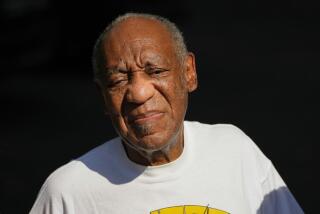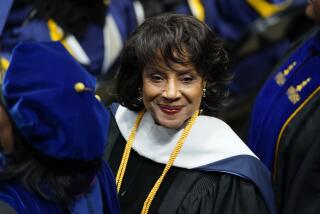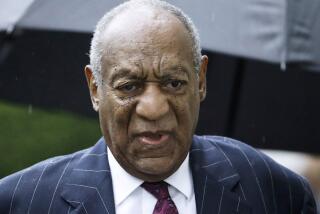A Balancing Act at the Top
IN 1984,after some 25 years in the business, Bill Cosby finally arrived. He’d made several films, including “Man and Boy” and “Hickey and Boggs”; had co-starred with Sidney Poitier and Harry Belafonte in “Uptown Saturday Night” and its sequel, “Let’s Do It Again”; he’d worked with Richard Pryor in “California Suite” and then appeared in “The Devil and Max Devlin.” But he’d also had two TV series fail (“The Bill Cosby Show” on NBC in 1971, and a 1976 ABC variety show, “Cos”)--which made the unparalleled success of NBC’s “The Cosby Show” all the more astounding.
Now, as co-executive producer (along with Marcy Carsey and Tom Werner) of the No. 1-rated show and creator of its spinoff, “A Different World,” Cosby is reported to have made a total of $84 million in 1986 and 1987. Despite the recent failure of “Leonard Part 6,” which Cosby produced and starred in, Cosby has more control than any black has ever had in the history of Hollywood.
His success has led to scrutiny, which in turn has led to accusations that he has done little to help the “black cause.” Off screen, the crews for both shows are racially balanced, but most of the writers, executive producers and producers are white. As one critic, a black studio executive, points out: “In television the power position is the producer’s role. That’s who the networks come to to make deals, staff the crew and plot the direction of the show. Film is a director’s medium--he makes all the decisions. There are barely any blacks in either of these jobs.” (Requests for interviews with Cosby were declined by his publicist.)
Nonetheless, Cosby has his defenders. “A Different World” has a white director, Ellen Falcon. “The Cosby Show” currently employs three directors, Jay Sandrich, Tony Singletary and production executive Regge Life; Singletary and Life are black. “Cosby gets black people involved in every capacity on the show, from the crew to several key positions,” says stage manager Chuck Vinson, a black, who’s been given the chance to direct a couple of Cosby episodes. “I worked on ‘Benson,’ which was integrated, but not nearly as much as Cosby’s show.”
“I think the anti-Cosby comments are racist,” says Life, another Cosby supporter. “People are still arguing about separate worlds, whereas I think television, as today’s No. 1 teacher, should be showing a homogeneous, global community.” Cosby insists on hanging the paintings of black artists in the home of his TV family, the Huxtables, and puts Ebony and Jet magazines on their coffee table.
And Cosby quietly signed a deal with Robert Hooks to be a co-executive producer for a miniseries on the life of Langston Hughes, based on Arnold Rapersad’s biography of the black poet and writer. Hooks is a well-respected actor, director and producer whose friendship with Cosby dates back 20 years, when they became the first and second black regulars on television series--Cosby on “I Spy” and Hooks on “N.Y.P.D.”
“I went to Bill with this project because he is the only person, black or white, who can get it on the air,” Hooks says. “In reality, the networks aren’t interested in Langston Hughes, although he was at the epicenter of the Harlem renaissance from the 1920s to ‘40s. I believe the story of his life is important to everyone, so I sent Bill the book, he read it, and we signed a co-venture deal within the week.
“My feeling is that successful black entertainers usually don’t have the forethought to use their leverage to make changes and create black-oriented product for television or film,” continues Hooks. “Most successful entertainers put on blinders, and their white managers or agents become their ‘great white fathers.’ They either don’t realize or (don’t) take advantage of the fact their managers work for them.”
More to Read
The complete guide to home viewing
Get Screen Gab for everything about the TV shows and streaming movies everyone’s talking about.
You may occasionally receive promotional content from the Los Angeles Times.






